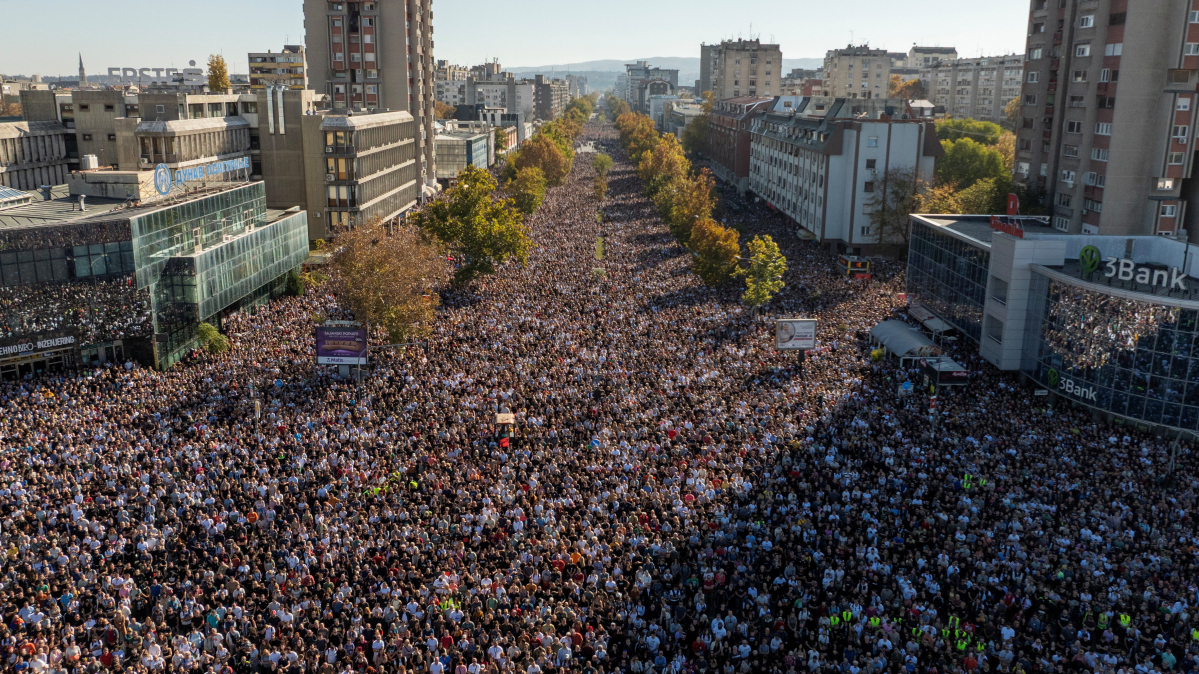'Leadership must change': Scottish Labour leader calls on UK Prime Minister Keir Starmer to quit
Scottish Labour leader Anas Sarwar has called on Prime Minister Keir Starmer to step down, saying that “the distraction needs to end and the leaders...

Tens of thousands of demonstrators filled Serbia’s second-largest city on Saturday, marking one year since a railway station roof collapse killed 16 people, a tragedy that has fuelled public outrage over alleged corruption and lack of accountability.
Months of nationwide protests, driven by frustration over the failure to prosecute those deemed responsible, have shaken President Aleksandar Vučić’s long-standing hold on power and intensified calls for early elections.
Crowds converged on Novi Sad, the site of the disaster by car, bus, and on foot, with witnesses describing the city’s main boulevard packed with demonstrators. Many, particularly young people, observed 16 minutes of silence — one for each victim — at 11:52 a.m. (10:52 GMT), the exact moment the roof gave way during renovation works on 1 November 2024.
Protesters carried red heart-shaped placards bearing the victims’ names, held white flowers, and laid wreaths outside the railway station. One grieving father, dressed in black, stood silently for hours before his daughter’s name displayed on the station’s perimeter fence.
Unlike previous demonstrations that saw police use stun grenades and tear gas, Saturday’s protest remained peaceful.
“This is a major tragedy for the Serbian people. We cannot bring them back, but we can share the pain with their families and say that enough is enough,” said Sladjana Burmaz, a 51-year-old economist from Valjevo. “These people were not killed by accident — their deaths reflect a broken system and failed politics. Justice will only be done when those responsible are held to account.”
President Vučić posted a photo on Instagram showing himself lighting a candle at a memorial service in Belgrade, writing: “Let the names of those who died remind us that human life stands above any divisions.” The government declared Saturday a national day of mourning.
The protest movement, led by students, academics, and opposition figures, has accused Vučić’s populist administration of corruption, cronyism, poor governance, and restrictions on media freedom — charges the government rejects.
An independent commission of academics, judges, and technical experts told the European Parliament last week that its investigation uncovered high-level state corruption behind poor construction standards and the hiring of unqualified subcontractors.
Government officials have denied these claims, with Vučić and Parliament Speaker Ana Brnabić recently suggesting the collapse may have been an act of terrorism.
Several senior state officials have been charged with endangering public safety, but the court has yet to confirm the indictment — delaying the start of any trial.
U.S. President Donald Trump has criticised American freestyle skier Hunter Hess after the athlete said he felt conflicted about representing the United States at the Winter Olympics in Italy, sparking a public clash that highlights growing political tensions surrounding the Games.
U.S. skiing great Lindsey Vonn underwent surgery in an Italian hospital on Sunday after her attempt to win Olympic downhill gold ended in a violent crash just seconds into the race at the Milano Cortina Winter Games.
A Japanese city near Mount Fuji has cancelled its annual cherry blossom festival, saying growing numbers of badly behaved tourists are disrupting daily life for residents.
Several avalanches struck northern Italy on Saturday, killing at least three people, as rescue officials warned the death toll could rise with unstable conditions persisting across the Alps.
U.S. President Donald Trump’s Middle East envoy Steve Witkoff and Trump’s son-in-law Jared Kushner visited the USS Abraham Lincoln aircraft carrier in the Arabian Sea on Saturday after completing a round of talks with Iran.
Scottish Labour leader Anas Sarwar has called on Prime Minister Keir Starmer to step down, saying that “the distraction needs to end and the leadership in Downing Street has to change.”
António José Seguro’s decisive victory over far-right challenger André Ventura marks an historic moment in Portuguese politics, but analysts caution that the result does not amount to a rejection of populism.
Japan’s snap election has delivered a landslide victory for Sanae Takaichi, giving her a strong mandate to advance fiscal expansion and defence reforms. But, analysts warn that inflation risks and funding challenges could complicate her agenda.
Australia’s move to ban social media access for children under 16 has intensified a global debate, as governments across Europe and beyond weigh tougher rules amid growing concerns over mental health, safety and screen addiction.
The UK has pledged to step up engagement with Beijing after Hong Kong media tycoon and British citizen Jimmy Lai was sentenced to 20 years in prison, with the case resurfacing as a key issue following Prime Minister Keir Starmer’s recent trip to Beijing.
You can download the AnewZ application from Play Store and the App Store.

What is your opinion on this topic?
Leave the first comment